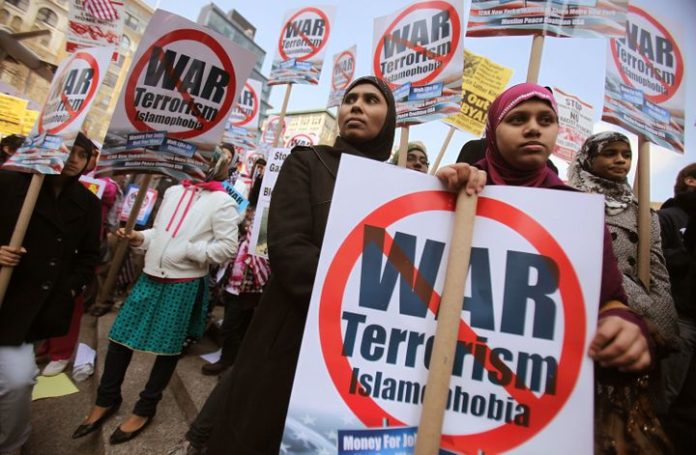Introduction
The very popular favourite claim of orientalists and islamophobes is to accuse Muslims for conversion by force using the expansion of Islamic empires and vast military conquests in support of this claim. Cherry picking technique is employed to quote verses from scripture, which is deceptive and misleading. The world at that time was much different from the present, wherein as per international law every human being is free to adopt and practice any faith, (at least in theory) but this was not the case earlier. The religion of Emperor and ruling class was to be the religion of subjects. Greco-Romans and Persian empires dominated the known world. Even in this era of so called ‘Civilized World’ invasions, military interventions, occupation and annexation of foreign lands continues on one pretext or the other. Palestine, Kashmir, Crimea, Afghanistan, Iraq, Syria, Libya and Yemen are suffering due to foreign interventions and occupation. Wars for empire building continues during recorded history of last two millennia, there is no distinction of religion, Christian conquering Christians and Muslim kings fighting with Muslims kings for empire building. However sometime we find wars among Christians and Muslims, alliances between Christian and Muslims against opponents with similar religious background [Europe, Turkey, Spain, Russia, Iran in Middle East and Central Asia]. Hence one must differentiate between empire building and religious conversions. Although some people may get inclined towards the faith of rulers which cannot be termed as forced conversion. Spain is the glaring example, which even after 900 years of Muslim rule remained Christian. Conversion by force was used by Christians, while except for occasional individual exceptions it was not employed by Muslims, rather conversion to Islam was discouraged by most Muslim rulers to get poll tax (Jazyaah) from non-Muslims. The issue of forced conversion is being examined in the light of scripture and history.
As the strategic and tactical aspects of warfare are always changing, theories and doctrines relating to warfare are often reformulated before, during, and after every major war. Carl von Clausewitz said, ‘Every age had its own kind of war, its own limiting conditions, and its own peculiar preconceptions.’ The one constant factor is war’s employment of organized violence and the resultant destruction of property and/or lives that necessarily follows. Use of religion as a cause or source of motivation or justification has been a favourite tool of warriors.
A religious war is a war caused by, or justified by, differences in religion. The European wars of religion of the 16th and 17th centuries are the classical example, often referred to simply as “the wars of religion”. Earlier (medieval) wars also frequently cited as “religious wars” include the Muslim conquests (7th to 19th centuries) and the Christian military excursions against the Muslim conquests, including the Crusades (11th to 13th centuries), the Spanish Reconquista (8th to 15th centuries) and the Ottoman wars in Europe (15th to 19th centuries).
Muslim Fighting Muslims
History is full of infighting among Muslims right from the early days. The Battle of the Camel, sometimes called the Battle of Jamal or the Battle of Bassorah took place at Basra, Iraq in 656 C.E(36 Hijrah) against Hazrat Ali bin Abi Talib, the 4th Caliph. Some other examples from history are quoted here:
Wars between Bani Umayyah rulers and Abbasids who were ultimately replaced by Mongol Empire. (1206-1368). At the time of Genghis Khan, virtually every religion had found Mongol converts, from Buddhism to Christianity, from Manichaeism to Islam. Eventually, each of the successor states adopted the dominant religion of the local populations: the Chinese-Mongolian Yuan dynasty in the East (originally the great khan’s domain) embraced Buddhism and Shamanism, while the three Western khanates, the Ilkhanate, Golden Horde, and the Chagatai Khanate three of the four principal khanates (except for the Yuan dynasty) embraced Islam.
Islam was a widespread religion in what is now Spain and Portugal for nine centuries, (711-1492 / 1571) beginning with the Umayyad conquest of Hispania and ending (at least overtly) with its prohibition by the modern Spanish state in the mid-16th century and the expulsion of the Moriscos in the early 17th century. Oppression, torture, killings and forced conversion of Muslims and Jews in Spain through Inquisitions sanctioned by the Pope is dark chapter of history.

Timur (1336-1405) was a Turco-Mongol conqueror who founded of the Timurid Empire in Persia and Central Asia. Timur gained control of the western Chagatai Khanate by 1370. From that base, he led military campaigns across Western, South and Central Asia, the Caucasus and southern Russia, and emerged as the most powerful ruler in the Muslim world after defeating the Mamluks of Egypt and Syria, the emerging Ottoman Empire, and the declining Delhi Sultanate (all Muslim empires). It is estimated that his military campaigns caused the deaths of 17 million people (mostly Muslims), amounting to about 5% of the world population at that time.
The Delhi Sultanate was a Muslim sultanate based mostly in Delhi that stretched over large parts of the Indian subcontinent for 320 years (1206-1526). Five dynasties ruled over the Delhi Sultanate sequentially, all Muslims fighting and replacing other Muslims, namely the Mamluk dynasty (1206-90), the Khalji dynasty (1290-1320), the Tughlaq dynasty (1320-1414), the Sayyid dynasty (1414&-51), and the Lodi dynasty (1451-1526). Finally defeated by Babur in 1526 who established the great Mughal empire.
Emperor Nader Shah, the Shah of Persia (1736-47) and the founder of the Afsharid dynasty of Persia invaded the Mughal Empire, eventually attacking Delhi in March 1739. His army had easily defeated the Mughals at the battle at Karnal and would eventually capture the Mughal capital in the aftermath of the battle. Nader Shah’s victory against the weak and crumbling Mughal Empire in the far East meant that he could afford to turn back and resume war against Persia’s archrival, the neighbouring Ottoman Empire, but also the further campaigns in the North Caucasus and Central Asia.
It has been estimated that in Delhi during the course of six hours in one day, 22 March 1739, approximately 20,000 to 30,000 Indian men, women and children were slaughtered by the Afsharid troops during the massacre in the city. The plunder seized from Delhi was so rich that Nadir stopped taxation in Persia for a period of three years following his return. The Ottoman Sultan Mahmud I initiated the Ottoman-Persian War (1743-1746), in which Muhammad Shah closely cooperated with the Ottomans until his death in 1748.
The Ottoman Empire controlled much of Southeast Europe, Western Asia and North Africa between the 14th and early 20th centuries. After 1354, the Ottomans crossed into Europe with the conquest of the Balkans. The Ottomans ended the Byzantine Empire with the 1453 conquest of Constantinople by Mehmed the Conqueror. During the 16th and 17th centuries, at the height of its power under the reign of Suleiman the Magnificent, the Ottoman Empire was a multinational, multilingual empire controlling most of Southeast Europe, parts of Central Europe, Western Asia, parts of Eastern Europe and the Caucasus, North Africa and the Horn of Africa. Twice Vienna was besieged. Ottoman Empire ended in 1922 and finally replaced by Kemal Ataturk.

Christians Fighting Christians
European history is full of wars with short periods of peace, longest since Second World War, if the cold war is ignored. Apart from recent non-religious first and second world wars, in Europe the wars were fought after the Protestant Reformation’s beginning in 1517, which disrupted the religious and political order in the Catholic countries of Europe. The European wars of religion were a series of religious wars waged in Europe in the 16th, 17th and early 18th century. However, religion was not the only cause of the wars, which also included revolts, territorial ambitions, and Great Power conflicts. For example, by the end of the Thirty Years’ War (1618-1648), Catholic France was allied with the Protestant forces against the Catholic Habsburg monarchy. The wars were largely ended by the Peace of Westphalia (1648), establishing a new political order that is now known as Westphalian sovereignty. However, religion-based armed conflict persisted in Europe, such as the Wars of the Three Kingdoms (1639-1651) on the British Isles and the Savoyard-Waldensian Wars (1655-1690) and Toggenburg War (1712) in the Western Alps, until the 1710s.
The conflicts began with the minor Knights’ Revolt (1522), followed by the larger German Peasants’ War (1524-1525) in the Holy Roman Empire. Warfare intensified after the Catholic Church began the Counter-Reformation in 1545 against the growth of Protestantism. The conflicts culminated in the Thirty Years’ War (1618-1648) which devastated Germany and killed one-third of its population. The Peace of Westphalia (1648) put an end to the war by recognising three separate Christian traditions in the Holy Roman Empire: Roman Catholicism, Lutheranism and Calvinism. Although many European leaders were ‘sickened’ by the bloodshed by 1648, religious wars continued to be waged in the post-Westphalian period until the 1710s, and collective memory of the wars lasted even longer. There is a very long list of wars and conflicts in Europe which can be explored in history.
Muslim-Christian Wars
The Byzantine Empire (Eastern Roman Empire and Byzantium) was the continuation of the Roman Empire in its eastern provinces with capital city Constantinople (modern-day Istanbul, which had been founded as Byzantium). It controlled the Palestine and parts of Middle East. The expansion of Islam came in direct conflict with Byzantine and Persian Sassanid Empires, both dominating super powers of known world. The Persian Empire in the Sasanian era was interrupted by the Muslims Arab conquest of Persia in 651 C.E, establishing the even larger Islamic caliphate, and later by the Mongol invasion. The main religion of ancient Persia was the native Zoroastrianism, but after the seventh century, it was slowly replaced by Islam which achieved a majority in the 10th century. The Byzantine Empire survived the fragmentation and fall of the Western Roman Empire in the 5th century AD and continued to exist for an additional thousand years until it fell to the Muslims, Ottoman Turks in 1453. The memories of Ottomans conquest of Eastern Europe, Greece, siege of Vienna, northern Africa and Russian areas in East haunts the Europeans. The Muslim-Christian conflict reached new heights in Crusades (1096-1291) for Holy Land.
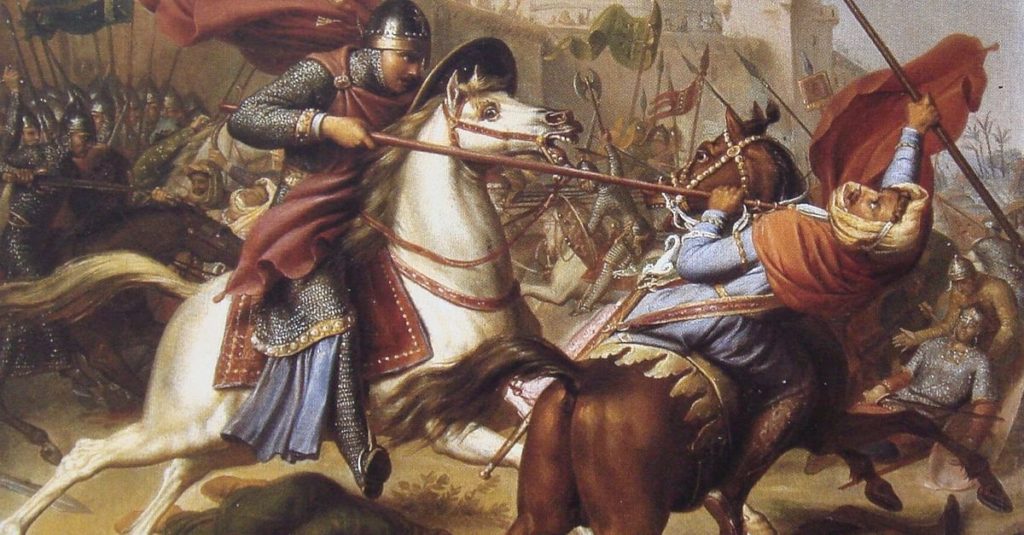
The battle of Tours (AD 732) marks the farthest advance of a Muslim army into western Europe when Muslim incursions were threatening central and northern France. Already in 732 Abd Al-Rahman’s large army had taken Bordeaux from Duke Eudes and his Aquitanians and had begun making its way northwards. Eudes sought help from his enemy, Charles Martel. So serious was the perceived Muslim threat, the Christian leaders united and met the Muslim army between Tours and Poitiers on 10 October. In the fighting Abd al-Rahman was killed, precipitating a Muslim collapse. Nonetheless, the Muslim presence in Iberia continued for another seven centuries after Tours – the Islamic State of Granada did not fall until 1492.
The Crusades – Battle of Hattin (1187): This victory was Saladin’s crowning achievement and the Muslims’ most renowned triumph against the Crusaders in the Holy Land. Jerusalem fell to Saladin, Ayyubid Sultan of Egypt and Syria. Christian Europe responded by launching the Third Crusade [1189-92], but Richard the Lion heart met with only limited success, and the days of the crusader states were numbered.
The colonization of Muslim lands by Europeans during last four centuries and world domination has created more suspicion and hatred. The world’s colonial population at the time of the First World War totaled about 560 million, of whom 70% were in British domains, 10% in French, 9% in Dutch, 4% in Japanese, 2% in German, 2% in American, 2% in Portuguese, 1% in Belgian and 1/2 of 1% in Italian possessions. The home domains of the colonial powers had a total population of about 370 million people. The creation of Israel, oppression of Palestinians and destabilization of Muslim countries in the Middle East, Afghanistan and Pakistan on pretext of fighting US-West created terror groups has widened the gulf among masses. This brief peep into history throws light as to how the power game and domination of nations and civilization works. Religion is mostly used as a tool by the conflicting powers.
Expansion of Christianity
According to the Bible, the first church organized itself 50 days after Jesus’ death on the Day of Pentecost-when the Holy Spirit was said to descend onto Jesus’ followers. Most of the first Christians were Jewish converts, and the church was centered in Jerusalem. Shortly after the creation of the church, many Gentiles (non-Jews) embraced Christianity. Early Christians considered it their calling to spread and teach the gospel. One of the most important missionaries was the apostle Paul, a former persecutor of Christians. Paul’s conversion to Christianity is described in Acts of the Apostles. Paul preached the gospel and established churches throughout the Roman Empire, Europe and Africa. Many historians believe Christianity wouldn’t be as widespread without the work of Paul. In addition to preaching, Paul is thought to have written 13 of the 27 books in the New Testament.
Early Christians were persecuted for their faith by both Jewish and Roman leaders. In 64 A.D. Emperor Nero blamed Christians for a fire that broke out in Rome. Many were brutally tortured and killed during this time. Under Emperor Domitian, Christianity was declared illegal, if a person confessed to being a Christian, he or she was executed.
Starting 303 A.D. Christians faced the most severe persecutions to date under the co-emperors Diocletian and Galerius. This became known as the Great Persecution.
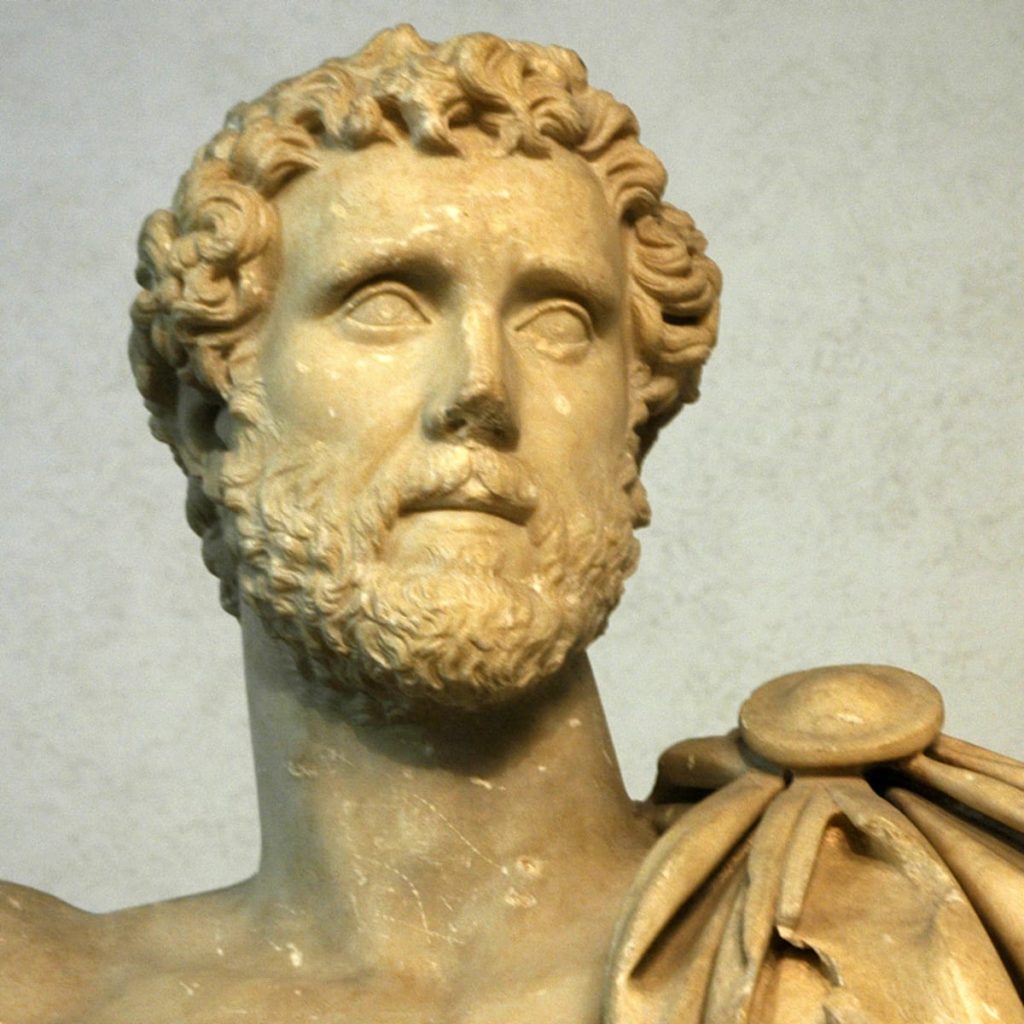
Emperor Constantine Embraces Christianity
When Roman Emperor Constantine converted to Christianity, religious tolerance shifted in the Roman Empire. During this time, there were several groups of Christians with different ideas about how to interpret scripture and the role of the church. In 313 A.D. Constantine lifted the ban on Christianity with the Edict of Milan and later tried to unify Christianity and resolve issues that divided the church by establishing the Nicene Creed. Many scholars believe Constantine’s conversion was a turning point in Christian history. The opposing sects of Christianity based on monotheism were brutally crushed and many followers were burnt alive. The oppressed become oppressors. The fundamental teachings of Jesus Christ (peace be upon him) are monotheism and love of humanity:
“Jesus said unto him, Thou shalt love the Lord thy God with all thy heart, and with all thy soul, and with all thy mind. This is the first and great commandment. And the second is like unto it, Thou shalt love thy neighbor as thyself. On these two commandments hang all the law and the prophets.” [Matthew 22 Verses 37 to 40 – Bible, King James Version]
This is a version of the Golden Rule: Do unto others as you would have them do unto you. First found in the Old Testament. Jesus tells the parable of the Good Samaritan to illustrate this commandment. However this is also attributed to him:
“Do not suppose that I have come to bring peace to the earth. I did not come to bring peace, but a sword.” (Matthew 10:34)
Christianity and The Sword
After having established as state religion of Roman Empire, Christianity was spread by military might, the sword. Backing up to the early Middle Ages, after Constantine legalized Christianity and popes anathematized other religions, Christianity burned books of non-Christians as well as heretics, and fed the authors and their followers to the lions. Christians destroyed temples and statues, forbidding anyone anywhere to believe anything other than orthodox Christianity as embraced by Eusebius, Bishop of Caesarea, and friend of Constantine. It was with the power of sword that the pagans of Europe were Christianized, as well as the Natives of the Americas. Peter the Great also Christianized Russia with the sword.
The Catholic Church
In 380 A.D. Emperor Theodosius I declared Catholicism the state religion of the Roman Empire. The Pope, or Bishop of Rome, operated as the head of the Roman Catholic Church. Catholics expressed a deep devotion for the Virgin Mary, recognized the seven sacraments, and honored relics and sacred sites. When the Roman Empire collapsed in 476 A.D. differences emerged among Eastern and Western Christians. In 1054 A.D. the Roman Catholic Church and the Eastern Orthodox church split into two groups.

The Holy Bible has enough for the Warmonger to Justify Wars of Oppression
o Jesus Christ also said: “I come not to bring peace, but to bring a sword” (Matthew 10:34)
o In the New Testament Jesus Christ says: “But as for these enemies of mine who did not want me to reign over them, bring them here and slay them before me.” (Luke;19:27)
o Do you think that I have come to bring peace to the earth? No, I tell you, but division. [Luke 12:51]
o Then another horse went forth. It was bright red, and its rider was granted permission to take peace from the earth and to make men slay one another. And he was given a great sword. [Revelation 6:4]
o ”When the crowds came to John for baptism, he said, “You brood of snakes! Who warned you to flee God’s coming wrath?” [Luke 3:7]
o Timothy 1:18: This command I entrust to you, Timothy, my son, in accordance with the prophecies previously made concerning you, that by them you fight the good fight.
o Hebrews 11:34: quenched the power of fire, escaped the edge of the sword, from weakness were made strong, became mighty in war, put foreign armies to flight.
o Revelation 2:16:Therefore repent; or else I am coming to you quickly, and I will make war against them with the sword of My mouth.
o Revelation 13:4: they worshiped the dragon because he gave his authority to the beast and they worshiped the beast, saying, “Who is like the beast, and who is able to wage war with him?”
o 1 Corinthians 14:8: For if the bugle produces an indistinct sound, who will prepare himself for battle?
o The horse is prepared for the day of battle, But victory belongs to the LORD.
o Job 38:23: Which I have reserved for the time of distress, For the day of war and battle?
Bible sanctions Ruthless Wars of Extermination
Bible does not mince words for the violent, ruthless and indiscriminate wars of extermination:
0 “Now therefore Kill every male among the little ones, and Kill every woman (female) that hath known man by lying (having sex) with him. But keep Alive for yourselves all the Girls and all the women who are Virgins.” (Numbers;31:17-18)
0 Now go and smite Amalek and utterly destroy all that they have, and spare them not but slay both man and woman, infant and suckling, ox and sheep, camel and ass.” (1 Samuel;15:3)
0 And they Utterly Destroyed all that was in the city, both man and woman, young and old, ox and sheep, and Ass, with the edge of the sword” (Joshua;6:21)
0 “slay utterly the old man, the young man and the virgin and little children and women; but come not near any man upon whom is the mark: and begin at my sanctuary. Then they began at the old men that were before the house.” (Ezekiel;9:6)
0 “and thirty-two thousand persons in all, women who had not known man by lying with him.”(Numbers; 31:35). “But in the cities of these peoples that the LORD your God gives you for an inheritance, you shall save alive nothing that breathes, (Deuteronomy; 20:16); “He (Joshua) let None remain alive.” (Joshua;10:28).
0 “Let the high praises of God be in their mouth, and a two-edged sword in their hand; To execute vengeance upon the heathen, and punishments upon the people; To bind their kings with chains, and their nobles with fetters of iron; To execute upon them the judgment written: this honor have all his saints. Praise ye the LORD” (Psalm;149:6-9).
0 “I came to cast fire upon the earth; and what do I desire, if it is already kindled?” (Luke;12:49)
0 “And, behold, one of those who were with Jesus stretched out his hand, and drew his Sword, and struck a servant of the high priests, and cut off his ear.” (Matthew;26:51).
0 Saint. Paul, in commending the worthy fruits of Faith, mentions the warriors of the Old Testament as his ideals: “And what more shall I say? For time would fail me to tell of Gideon, Barak, Samson, Jephthah, of David and Samuel and the prophets who through faith conquered kingdoms, enforced justice, received promises, stopped the mouths of lions, quenched raging fire, escaped the edge of the sword, won strength out of weakness, became mighty in war, put foreign armies to flight.” (Hebrews; 11: 32-34).
The monkish morality of the Gospels in their present form has never been followed by any self-respecting Christian in the history. The Crusades (1095-1291 C.E), Spanish inquisition against Muslims, Jews and Church inquisitions against different Christian sects on the pretext of heresy resulted in the death and destruction of millions. Christians slaughtered, massacred their fellow Christians with different views. The practice continued till thirty years war in Europe [1618-1648]. Then brutal wars for colonization were unleashed against non-Christians in Asia, Africa, America, Australia and all around the world. Similarly the Crusades was launched after 911 to kill millions of Muslims.

Expansion of Christianity by Sword
Once the oppressed Christians gained power, they become oppressors. The preaching through Gospel became subservient to conquests and conversion by force. Later the concepts of ‘Just war’ and ‘Holy War’ were also developed.
Forced conversions
After the Constantinian shift, Christianity became entangled with government. Throughout history the relationship between religion and politics has been complex, there is no doubt that religious institutions, including Christian ones, have been used coercively by governments, and that they have used coercion themselves. Augustine found that persuasion by argument was insufficient to the task of correcting heresy. He advocated government force in his Epistle 185, a Treatise Concerning the Correction of the Donatists, and justifying coercion from scripture. He cites Jesus striking Paul during Paul’s vision on the road to Damascus and also cites the parable of the great banquet in Luke 14:22-23. Such short term pain for the sake of eternal salvation was an act of charity and love, in his view. Examples of forced conversion to Christianity include:
o The Christian persecution of paganism under Theodosius l.
o Forced conversion and violent assimilation of pagan tribes in medieval Europe.
o The Inquisition (Muslims and Jews in Spain, Portugal), including its manifestations in Goa and Mexico.
o The forced conversion of indigenous children in North America, Africa and Australia, and, since 1992, the forced conversion of Hindus in Northeast India.
The Just war
The concept of “Just war”, whereby limited uses of war were considered acceptable originated with earlier non-Christian Roman and Greek thinkers. This theory was adapted later by Christian thinkers like St Augustine, who like other Christians, borrowed much of the justification from Roman writers like Cicero and Roman law. However its importance is connected to Christian medieval theory beginning from Augustine of Hippo and Thomas Aquinas. According to Jared Diamond, Augustine of Hippo played a critical role in delineating Christian thinking about what constitutes a just war, and about how to reconcile Christian teachings of peace with the need for war in certain situations. Partly inspired by Cicero’s writings, Augustine held that war could be justified in order to preserve the state, rectify wrongs by neighboring nations, and expand the state if a tyrant will lose power in doing so. Even though “Just War” concept was widely accepted early on. Just war theorists combine both a moral abhorrence towards war with a readiness to accept that war may sometimes be necessary. The criteria of the just war tradition act as an aid to determining whether resorting to arms is morally permissible. Just War theories are attempts “to distinguish between justifiable and unjustifiable uses of organized armed forces”; they attempt “to conceive of how the use of arms might be restrained, made more humane, and ultimately directed towards the aim of establishing lasting peace and justice.” Concepts such as “Holy war”, whereby fighting itself might be considered a penitential and spiritually meritorious act, did not emerge before the 11th century.
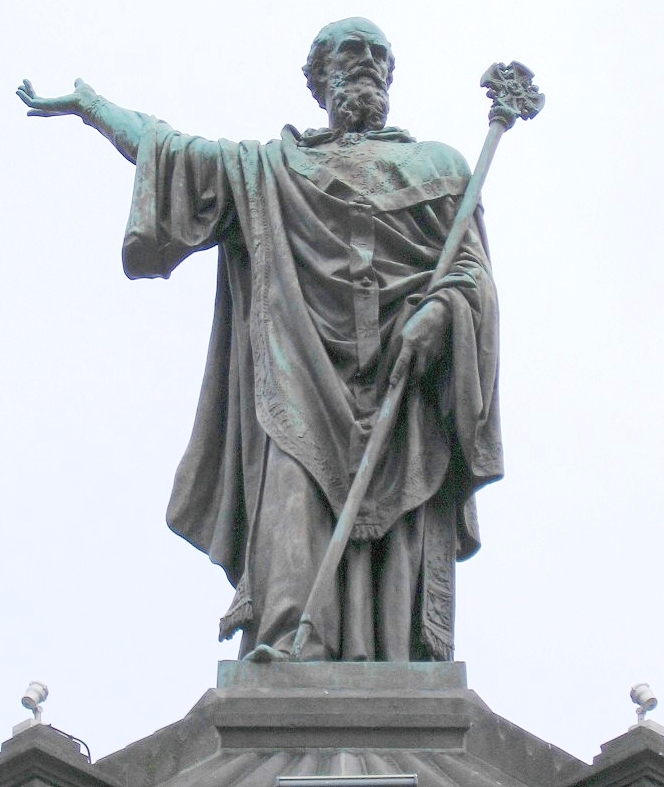
The Holy War
Pope Urban II declared in 1095, at the Council of Clermont, that some wars could be deemed as not only a bellum iustum (“just war”), but could, in certain cases, rise to the level of a bellum sacrum (holy war). This was a “remarkable transformation in the ideology of war”, shifting the justification of war from being not only “just” but “spiritually beneficial”. Thomas Murphy examined the Christian concept of Holy War, asking “how a culture formally dedicated to fulfilling the injunction to ‘love thy neighbor as thyself’ could move to a point where it sanctioned the use of violence against the alien both outside and inside society”. The religious sanctioning of the concept of “holy war” was a turning point in Christian attitudes towards violence; “Pope Gregory VII made the Holy War possible by drastically altering the attitude of the church towards war. Hitherto a knight could obtain remission of sins only by giving up arms, but Urban invited him to gain forgiveness ‘in and through the exercise of his martial skills’.” In the 12th century, Bernard of Clairvaux wrote: “The knight of Christ may strike with confidence and die yet more confidently; for he serves Christ when he strikes, and saves himself when he falls. When he inflicts death, it is to Christ’s profit, and when he suffers death, it is his own gain.”
A holy war was defined by the Roman Catholic Church as “war that is not only just, but justifying; that is, a war that confers positive spiritual merit on those who fight in it”
The consensus among Christians on the use of violence has changed radically since the crusades were fought. The just war theory prevailing for most of the last two centuries that violence is an evil which can in certain situations be condoned as the lesser of evils is relatively young. Although it has inherited some elements (the criteria of legitimate authority, just cause, right intention) from the older war theory that first evolved around 400 C.E, it has rejected two premises that underpinned all medieval just wars, including crusades: first, that violence could be employed on behalf of Christ’s intentions for mankind and could even be directly authorized by him and second, that it was a morally neutral force which drew whatever ethical coloring it had from the intentions of the perpetrators.
Saxon Wars
The campaigns and insurrections of the more than thirty years from 772, when Charlemagne first entered Saxony with the intent to conquer, to 804, when the last rebellion of disaffected tribesmen was crushed. In all, eighteen battles were fought in what is now northwestern Germany. They resulted in the incorporation of Saxony into the Frankish realm and their forcible conversion from Germanic paganism to Catholicism.
The Crusades
No Christian can ignore the shame that the Crusades have brought on the Christian church, especially in the eyes of Jews and Muslims. Modern evangelical churches sometimes use the word Crusade to describe an outreach program in their local area, overlooking the fact that Jews and Muslims associate the concept of a crusade as an attack of terror on their communities. The Crusades were a series of religious wars sanctioned by the Latin Church in the medieval period. The most commonly known Crusades were the campaigns in the Eastern Mediterranean aimed at recovering the Holy Land from Muslim rule, but the term “Crusades” is also applied to other church-sanctioned campaigns, such as the crusade against the Cathars and the Baltic Crusades. These were fought for a variety of reasons including the suppression of paganism and heresy, the resolution of conflict among rival Roman Catholic groups, or for political and territorial advantage. At the time of the early Crusades the word did not exist, only becoming the leading descriptive term around 1760.
Between about 1095 A.D. and 1230 A.D. the Crusades, a series of holy wars, took place. In these battles Christians fought against Muslims to reclaim holy land in the city of Jerusalem. The Christians were successful in occupying Jerusalem during some of the Crusades, but they were ultimately defeated. After the Crusades, the Catholic Church’s power and wealth increased.
Northern Crusades
Religious wars primarily undertaken by the Christian military orders and kingdoms against the pagan Baltic, Finnic and Slavic peoples around the southern and eastern shores of the Baltic Sea. The crusades took place mostly in the 12th and 13th centuries and resulted in the subjugation and forced baptism of indigenous peoples. Most notable campaigns were Livonian and Prussian crusades. Albigensian Crusade: (1209-1229) was a 20-year military campaign initiated by Pope Innocent III to eliminate Catharism in Languedoc, in the south of France.
The Reformation
In 1517, a German monk named Martin Luther published 95 Theses-a text that criticized certain acts of the Pope and protested some of the practices and priorities of the Catholic church. Later, Luther publicly said that the Bible didn’t give the Pope the sole right to read and interpret scripture. Luther’s ideas triggered the Reformation-a movement that aimed to reform the Catholic church. As a result, Protestantism was created, and different denominations of Christianity eventually began to form.
Colonization and Forced Conversions
The colonization of world by Europeans from fifteenth century gave a boost to the spread of Christianity. In some colonies Christianity became the main religion whereas in others it held a foothold. Brutal killings and massacre of natives in America, Australia and Africa and their forced conversion to Christianity is a black spot on the face of Christianity. Crusaders in Europe forced conversion of Scandinavians to Christianity.
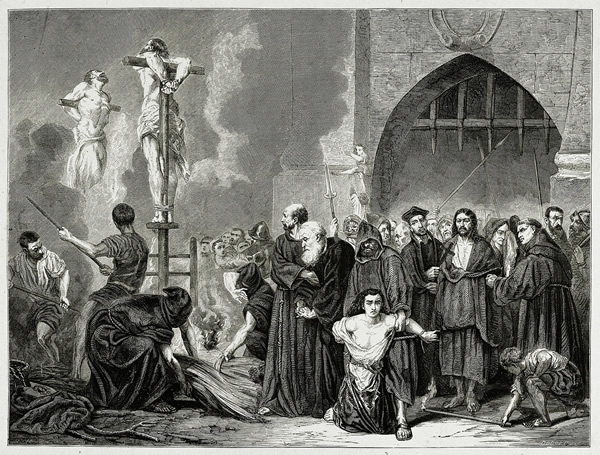
Inquisitions
The Inquisition was a powerful office set up within the Catholic Church to root out and punish heresy throughout Europe and the Americas. Beginning in the 12th century and continuing for hundreds of years, the Inquisition is infamous for the severity of its tortures and its persecution of Jews and Muslims. Its worst manifestation was in Spain where the Spanish Inquisition was a dominant force for more than 200 years, resulting in some 32,000 executions. The Muslims were expelled after 900 years stay in Spain along with Jews. In 1808, Napoleon conquered Spain and ordered the Inquisition there to be abolished.
Christian Denominations
Christianity is broadly split into three branches: Catholic, Protestant, and (Eastern) Orthodox. The Catholic branch is governed by the Pope and Catholic Bishops around the world. The Orthodox (or Eastern Orthodox) is split into independent units each governed by a Holy Synod; there is no central governing structure akin to the Pope.
There are numerous denominations within Protestant Christianity, many of which differ in their interpretation of the Bible and understanding of the church. Some of the many denominations that fall under the category of Protestant Christianity include:
Baptist, Episcopalian, Non-Denominational, Evangelist, Methodist, Presbyterian, Pentecostal/Charismatic, Lutheran, Anglican, Evangelical, Assemblies of God, Christian Reform/ Dutch Reform, Church of the Nazarene, Disciples of Christ, United Church of Christ, Mennonite, Christian Science, Quaker, Seventh-Day Adventist. Although the many sects of Christianity have differing views, uphold separate traditions, and worship in distinct ways, the core of their faith is centered on the life and teachings of Jesus.
Muslim Wars of Expansions
If it is assumed for a moment that Islam is especially predisposed towards violence, then one has to prove why the history of Jihadi terrorism is so very short: this is emphatically a late 20th and early 21st century phenomenon, yet Islam has been around since the seventh century, writes David Shariat-Madari in The Guardian. What about its wars of conquest? Well they definitely happened, but not in a way that marks Islam out from other cultures. The subsequent wave of imperial expansionism came via the sky-worshipping Mongols, before they settled down to become Muslims. Not only that, the dominant (often genocidal) military powers since the 17th century have been Christian and they frequently regarded themselves as having a religious mission. Islam isn’t a pacifist religion, some aspects of Islamic teaching do indeed justify some kinds of resistance but under special conditions including self defence and against oppression. Violence is also advocated in Christianity, Judaism and other world faiths. It’s here that the question of politics geopolitics becomes inescapable. The Qur’an and the hadith, the sources of Islam, were taken up and used by certain political actors to justify horrific violence. Why? The answer must lie among the political, economic, military and social changes in the Middle East in present times, and how they have ramified in the wider world. It’s only by looking beyond the texts that we can hope to understand why certain interpretations of them have gained currency among a tiny minority but a minority willing to indiscriminately kill civilians Muslims and non-Muslims alike. If it is believed that the causes of terrorism are embedded in the Qur’an and hadith, one is proving unable to deal with the complexities of a world in which politics including military and non-military intervention by foreign powers – interacts with religion. Saying “there’s something special about Islam” saves the people from making the effort to learn more about this faith, the people who practice it and the conditions they live in. For some Islamophobes the natural conclusion is that people should be convinced to abandon Islam and if that doesn’t work, it should be driven out. This, of course, would be a grossly illiberal and violent programme due to long tradition of nationalism and supremacism in the West.
Islam has clearly laid down the principles for preaching the religion, conversion, defence against aggression and relations with non-Muslims:
“Invite to the way of your Lord with wisdom and good instruction, and argue with them in a way that is best. Indeed, your Lord is most knowing of who has strayed from His way, and He is most knowing of who is [rightly] guided.” (Quran;16:25)
“There shall be no coercion in matters of faith. Distinct has now become the right way from [the way of] error: hence, he who rejects the powers of evil and believes in God has indeed taken hold of a support most unfailing, which shall never give way: for God is all-hearing, all-knowing.(Quran;2:256)
“Whoever kills a human being, unless it is in the course of justice for murder or bloody crimes on the earth, it shall be as if he killed all mankind. And whoever saves one life it would be as if he saved the life of all mankind.”(Quran,5:32)
And Fight in God’s cause against those who wage war against you, but do not commit aggression – for, verily, God does not love aggressors.” (Qur’an;2:190)
“Permission to fight back (Qital) is hereby granted to the believers against whom war is waged and because they are oppressed; certainly Allah has power to grant them victory” (Qur’an;22:39)
“As for such ([of the unbelievers) as do not fight against you on account of (your] faith), and neither drive you forth from your homelands, God does not forbid you to show them kindness and to behave towards them with full equity: for, verily, God loves the equitable. (Qur’an;60:8)
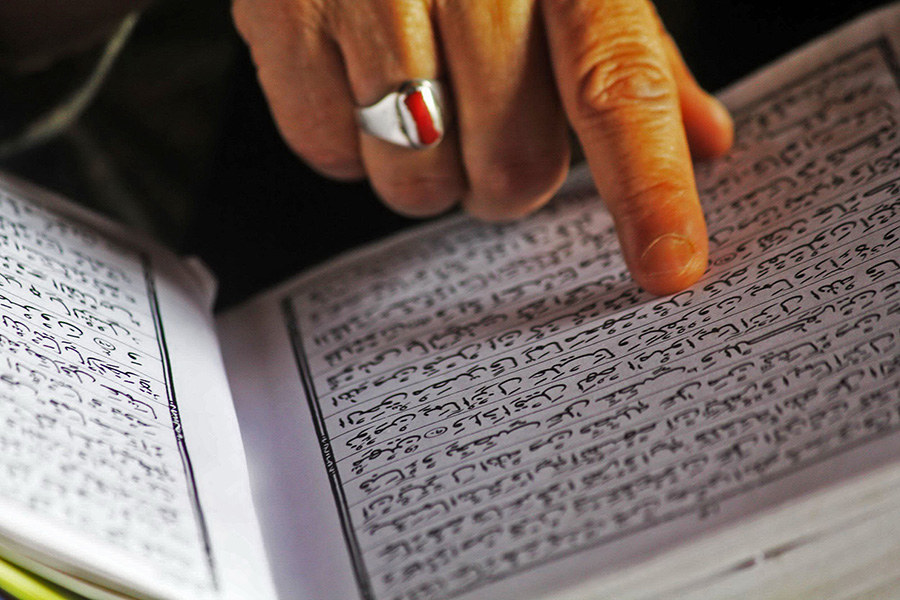
Forced Conversion to Islam not Permissible
Conversion by force is prohibited in Islam, some verses are again repeated here:
“There shall be no coercion in matters of faith. Distinct has now become the right way from the (way of) error: hence, he who rejects the powers of evil and believes in God has indeed taken hold of support most unfailing, which shall never give way: for God is all-hearing, all-knowing.” (Qur’an;2:256).
“So if they argue with you, tell them: “I have submitted myself entirely to Allah and so have those who follow me.” Then ask those who are given the Book and those who are illiterates (not having revealed scriptures): “Will you also submit yourselves to Allah?” If they become Muslims they shall be rightly guided but if they turn back, you need not worry, because your sole responsibility is to convey the Message. God is watching all His servants very closely.” (Qur’an;3:20).
“Call people to the Way of your Lord with wisdom and best advice, and reason with them, if you have to, in the most courteous manner: for your Lord knows best who strays from His Way and He knows best who is rightly guided.” (Qur’an;16:125).
“O Muhammad, declare: “O mankind! The truth has come to you from your Lord! He that follows guidance (Right Way) follows it for his own good, and he that goes astray does so at his own risk; for I am not a custodian over you.” (Qur’an;10:108).
“Say “The Truth is from your Lord”: let him who will believe and let him who will reject (it): for the wrongdoers We have prepared a Fire.” (Qur’an;18:29).
“Will they not then ponder on the Qur’an?” (Qur’an;4:82).
“Say, O Muhammad: “Would you dispute with us concerning God, who is our Lord and your Lord as well? We shall be accountable to Him for our deeds and you for yours; to Him alone we are devoted.” (Qur’an;2:139).
“And argue not with the followers of earlier revelations unless it be in (a way) that is better, save with such of them as do wrong; and say: We believe in that which hath been revealed unto us and revealed unto you; our God and your God is One, and unto Him we surrender. (Qur’an;29:46).
“Have you ever seen the one who has taken his own desires as his god? Would you take the responsibility of guiding him?” (Qur’an;25:43).
“If there are some among you who believe in the message with which I have been sent and others who disbelieve it, then be patient until Allah judges between us, for He is the best of all judges.” (Qur’an;7:87).
“He creates man out of (mere) drop of sperm: and lo! This same being shows himself endowed with the power to think and argue” (Qur’an;16:4).
Campaigns against Roman and Persian Empires
Prophet Muhammad (peace be upon him) had invited the rulers of neighboring powers to Islam. He sent ambassadors with letters to Heraclius the Caesar of Byzantium, Chosroes II the Khosrau of Persia, the Negus of Ethiopia, Muqawqis the ruler of Egypt, Harith Gassani the governor of Syria, Munzir ibn Sawa and to the ruler of Bahrain. These letters were received by their addresses in different ways. Some of them accepted Islam at once. Others treated the letters with consideration, but did not accept Islam. Still others treated them with ordinary courtesy while others like Khosrau of Persia showed contempt and pride. But history is witness to the fact-that the recipients of these letters or their peoples met with a fate in accordance with their treatment of these letters. Emperor of Persia ordered governor of Yemen to arrest the Prophet (Pbuh). This was an act of war. The Emperor was overthrown and killed by his son. Though Hercules treated the Muslim emissary like an ambassador but later there were reports of gathering of Roman forces to invade Madina. Prophet Muhammad (Pbuh) himself lead the expedition to Tabuk, the Romans withdrew, the battle did not take place. It is clear that the Roman and Persians had initiated the hostilities, the Muslim response later would merely be termed as “Offensive Defence”.
Conquest was the Norm
The world at that time was much different from the present, wherein as per international law every human being is free to adopt and practice any faith, (at least in theory) but this was not the case at that time. The Christians faced oppression and persecution under Romans for over 300 years till the conversion of Constantine to Christianity in early fourth century. The great Roman (Christian) and Persian (Zoroastrian) Empires were the biggest hindrances in conveying the message of Islam to their population. They were to be prevented from thrusting forcibly their disbelief upon their subjects and the future generations hence the conflict with them was inevitable. The object was not to coerce them to accept Islam, but to ensure that freedom of choice is provided to the people to choose between truth (Haqq) and falsehood (Batil) after deliberations. Hence they were enjoined to subdue the non-Muslim powers to establish the sovereignty of the Islamic State. By the period of Caliph Omar bin Khattab (634-644 C.E), not only Arabia was purged of non-believers but other areas as far as Afghanistan and Egypt were also brought under the folds of Muslim rule. The Muslims rulers are accused for discouraging conversion to Islam as they did not want to forego the Jazya (poll tax) levied on non-Muslims for protection and exemption from military. During over 700 years of rule the Muslims in Spain remained in minority, thus explained forcefully.
Muslim Missionaries and Traders
Muslim traders and missionaries reached the farthest corners of the planet right from the beginning. The mausoleum of Saad bi Abi Waqas, a pious companion of Prophet Muhammad (Pbuh) in China proves it. China, the Far East, Indonesia, Malaysia and Africa were converted to Islam through missionary activity of Arab traders. North Africa was conquered. Empire building and conquests were the norm of that period, the great conquests by Romans, Persian, Greeks [Alexander] are part of history. Muslims had their share as well. But history does not record forced conversions like Christians.
Even in today’s era of freedom and communications, the world is a global village. All countries are signatory to the UN Charter which provides freedom of faith and freedom of preaching to all. Missionaries of all faiths including Muslims freely travel around the world for Dawah. The Quran makes it obligatory to abide by covenants: “fulfill the covenant; for the covenant shall be questioned about.” (Quran;17:34). So now there is neither requirement nor justification for waging war or Jihad for this purpose.
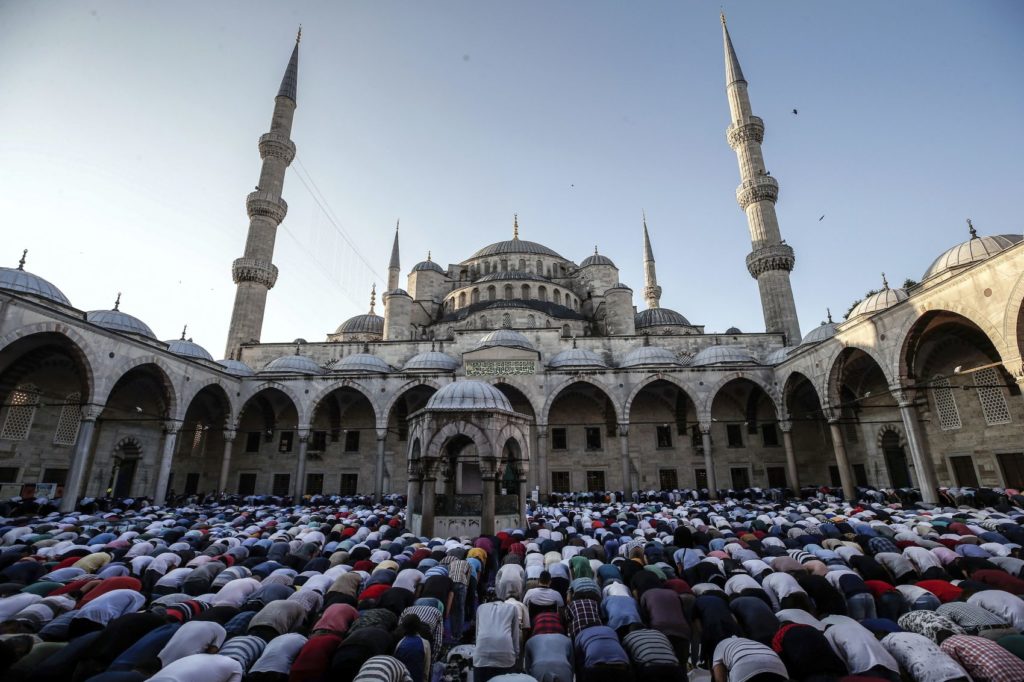
Islam – The fastest Growing Religion of The World
Islam is the fastest growing religion in the world. The statistics are commonly measured by the absolute number of adherents, the percentage of the absolute growth per year, and the growth of the number of converts in the world.
Resurgent Islam is one of the most dynamic religious movements in the contemporary world. The Vatican’s 2008 yearbook of statistics revealed that for the first time, Islam has outnumbered the Roman Catholics globally. It stated that, “Islam has overtaken Roman Catholicism as the biggest single religious denomination in the world”.
Apart from the higher growth rate, conversion through Dawah is another factor. While the world’s population is projected to grow 32% in the coming decades, the number of Muslims is expected to increase by 70% from 1.8 billion in 2015 to nearly 3 billion in 2060. In 2015, Muslims made up 24.1% of the global population. Forty-five years later, they are expected to make up more than three-in-ten of the world’s people (31.1%) according to a PEW research report.
Despite Islamophobia, Islam is also the fastest growing religion in Europe and USA. There are now as many as 7 to 8 million Muslims in the United States, half of them American-born. In recent years, Americans of African, European, Southeast Asian, Latin American and American Indian descent left their parents’ spiritual paths to follow Islam. But even as polls show anti-Islamist sentiment rising, Islam is the fastest-growing religion in Europe. Nearly 5 million Muslims live in France, the largest Muslim population in Europe, and some 4 million live in Germany. No armies are invading, but the power of rational arguments for Islam and inherent inconsistencies in Christianity are turning the people towards the better option. The false propaganda by the Islamophobes is exposed to any reasonable person who can search and find the reality to expose the lies and false propaganda against Islam, as being revealed here.
The Myth – Kill Non-Muslims
Accusing Muslims for killing non-Muslims is an absolutely false allegation, fabrication, deceit, white lie, reflecting either total ignorance, lack of knowledge of Islam, or the nefarious designs with evil intentions to defame Islam through false propaganda and baseless allegations. Quran is very clear on sanctity of human life, believer or non-believer.
Killing a believer, or innocent human not permitted in Islam: Quran;4:93, 5:32,17:33.
“if anyone slew a person unless it be for murder or for spreading mischief In the land it would be As if He slew the whole mankind: and if any one saved a life, it would be As if He saved the life of the whole mankind.” [Quran;5:32].
To kill or seek to kill an innocent human being, be it Muslim or non-Muslim, is to kill all innocent people. On the other hand, to save an individual life in the same circumstances is to save a whole community. What could be stronger condemnation of individual assassination and revenge?
“Nor take life which Allah has made sacred except for just cause. and if anyone is slain wrongfully, we have given His heir authority (to demand qisas or to forgive): but let Him nor exceed bounds In the matter of taking life; for He is helped (by the Law).” [Quran;17:33]
“If a man kills a believer intentionally, His recompense is Hell, to abide therein (for ever): and the wrath and the curse of Allah are upon him, and a dreadful penalty is prepared for Him.” [Quran;4:93]
Here are more references from Quran on the subject:
Killing only during hostilities in progress, 2:191,4:89, 4:91,5:33, 8:39, 8:57, 9:5, 9:12 ; 9:1-6 Don’t fight non-believers who neither fought against your faith nor driven you out of your homes, treat them justly; 60:8
Tolerance & Co-existence
No compulsion, coercion in religion 2:256 , 6:104,107; 88:21-26; 6:66,107; 10:108; 25:43; 39:41; 42:6; 4:80; 42:48; 3:20; 5:99; 16:3524:54; 29:18;42:48; 31:23; 18:29;
- Some believe, some disbelieve, God will judge; 7:87
- Sanctity of Human life; 17:33
- Killing one innocent human like killing humanity; 5:32
- Help and rescue the helpless oppressed old men, women, and children; 4:75
- Warfare in self-defense, Allah does not like transgressors.;2:190
- Friendship with non-believers; 60:9
- Preaching Islam with wisdom, fair exhortation, and reason; 16:125
- Non-believers rewarded [in this world; 13:26; 10:7; 53:29; 3:113-115; 42:20; 28:83,84; 18:46’ 20:131.
- Non-believers communities not destroyed for disbelief (only) if they behave righteously towards one another; 11:117; 3:178.
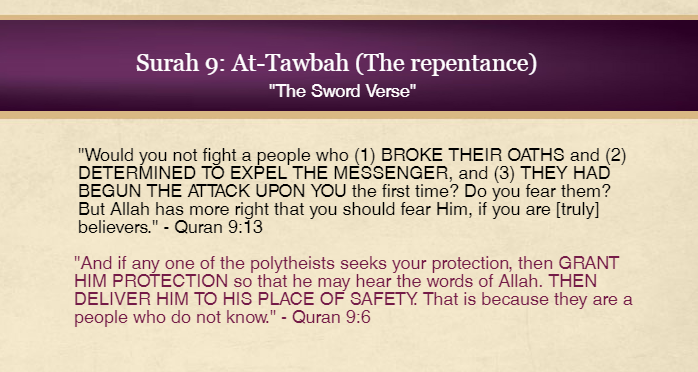
The Sword Verses
The so-called Sword Verse (ayat as-sayf) is the fifth verse of the ninth sura (Surat at-Tawbah) of the Quran. It is a widely-cited Quranic call to violence against “pagans” (“idolaters”, mushrikun), obliging Muslims to “fight and slay the Pagans wherever ye find them”. Explaining the context of this verse, scholar Muhammad Asad restricts the permission to fight and kill as being given regarding specific tribes already at war with the Muslims who had breached their peace agreements and had attacked them first. Dr. Shabbir Ahmad, M.D has given very brief explanatory descriptive translation:
“When the four Sacred Months are over and if the idolaters are still aggressing, neither becoming law-abiding citizens of the State, nor emigrating, subdue them wherever you find them, take them captive, and besiege them, and ambush them. But if they repent from aggression, and help in the consolidation of the Divine System and in setting up the Just Economic Order of Zakat, then leave them free. Verily, Allah is Forgiving Merciful.” (Quran;9:5)
This verse is specific to a war like situation, not in peace where normal working relations with non-Muslims exist, as mentioned in Quran [60:1-9]. Muslims are encouraged to act towards all the non-Muslims living in Islamic state with kindness and equity. There are many verses in the Qur’an stating that those who coexist peacefully with Muslims are entitled to justice, compassion, and respect, irrespective of their religion as long as they are peaceful with Muslims:
“As for such (of the unbelievers) as do not fight against you on account of your faith, and neither drive you forth from your homelands, Allah does not forbid you to show them kindness and to behave towards them with full equity. Indeed, Allah loves those who act equitably” (Quran;60:8)
If it were true that the Qur’an instructs that any non-Muslim should be killed because of his or her religion, then what would explain the fact that religious minorities through 1,400 years of Muslim history not only survived, but also thrived and found freedom to practice their faiths under Muslim rule? Clearly, Muslims as a people were not perfect, yet there were times when they had enough power to eliminate almost all non-Muslims under their rule. The historical record shows that they did not abuse this power. The restraint they showed seems to be influenced in the first place by the Qur’anic injunctions against coercion in religion.
The Qur’an allows a Muslim man to get married to a Christian or Jewish woman. If it were true that the Qur’an demands killing non-Muslims, how could it permit a Muslim man to marry such women? Marriage is the closest human relationship and is described in the Qur’an as a relationship characterized by peace, love, and compassion (30:21), not murder because of theological differences.
Is Islam Imperialistic?
It is also accused that there are verses in the Quran stating that Islam is the religion of truth, and therefore it must prevail over all other religions. (9:33, 48:28 and 61:9) The Islam, practiced according to its original sources, the Qur’an and Sunnah, is not imperialistic at all. Some Muslim rulers throughout history may have deviated from its teachings in some degree or the other. Their actions, however, are not to be equated with normative Islam. Some jurists even gave opinions that seemed to have justified these actions. Such interpretations may have been influenced by the kind of world in which they lived, which is vastly different from ours today. None of these scholars claimed infallibility or finality of their interpretations. Yet, whether such interpretations were valid for their times and specific circumstances or whether they were contrary to the overall text and spirit of Islam, the fact remains that interpretation of the primary sources of Islam is an endeavor which is not frozen in time. Historically, those who espoused such arguments may have erred in understanding some parts of the Qur’an. They may have failed to understand how those parts fit into the total picture of the teachings of the Qur’an teachings on the relationship between Muslims and others.
History bears testimony that Islam spread much faster during the periods of peace, not war. Even in periods when Muslims did not “prevail” economically, socially, militarily, or politically, Islam continued to spread. The same phenomenon can be seen in our time, which is a time of great suffering and persecution of Muslims in many parts of the world. Even some of those who attacked Islam and Muslims and committed horrible massacres of Muslims, such as the Mongols and the Crusaders, ultimately accepted Islam themselves. It is rather interesting to see the conqueror accepting the faith of the conquered rather than the reverse.
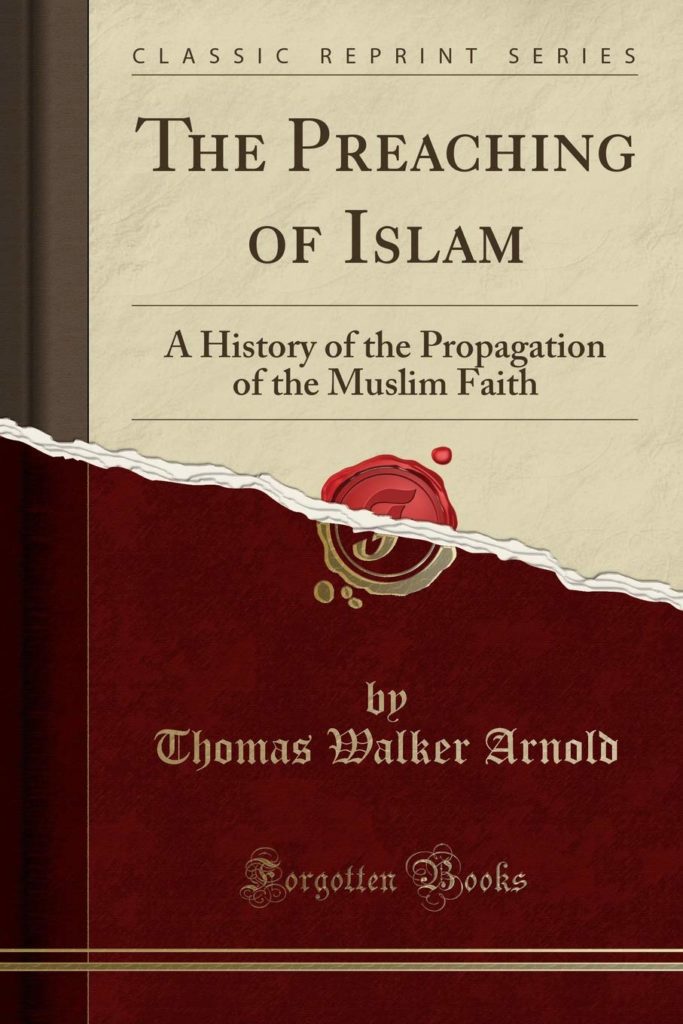
Clear historical and geographical facts show that Islam has spread more by peaceful means than by force. A look at the map of the Muslim world today shows that the bulk of Muslims live in countries where there was no fighting, not even defensive fighting. An example is Indonesia, with nearly 200 million Muslims. Thomas Arnold, a former Christian missionary in India, in his famous book Preaching of Islam, indicated that while there have been certain periods where Muslim rulers have diverted from this tolerance, it was the fault of the rulers and not attributed to Islamic teachings. He concludes that the two primary reasons for the spread of Islam all over the world were the merchants and the Sufis (mystics), two groups of people who went out, worked with humanity, and gently invited others to the path of Allah.
If it were true that Islam allows use of force to convert people, then how did religious minorities thrive in regions under Muslim rule? It is also worth asking why the Qur’an and Sunnah explicitly dictated regulations and rights for the protection of non-Muslim minorities living under the rule of Islam, if other religions are to be eliminated so that Islam may “prevail?” The Prophet (peace be upon him) even said that if a Muslim hurts a dhimmi or covenanted person (a non-Muslim living under the rule of Islam) or commits any injustice to him, then on the Day of Judgment, the Prophet (peace and blessings be upon him) will be the advocate on behalf of the non-Muslim against the Muslim.
What is the sense of these prescriptions and advice if those people had to accept Islam or be killed? Why does the Qur’an repeatedly speak about peaceful dialogue with non-Muslims (Quran;29:46) if they have to be killed in the first place? If indeed Islam insists on the use of force for conversion, then why did people, when no longer under Muslim rule, not revert back to their previous faiths?
How to Prevail or Proclaim or Manifest over other Religions?
It is true that three verses in the Qur’an (At-Tawbah 9:33, Al-Fath 48:28, and As-Saff 61:9) state that Allah sent forth His Messenger (Muhammad, Pbuh) with the message of guidance and the religion of truth, so that it may “prevail” over all religions.
What does prevail mean in this context?
Must we limit our understanding of the word prevail to the narrow context of military or political power? There have been many tyrannical empires throughout history that prevailed economically, politically, or militarily at one time or another. Their dominance was impermanent. This is a very superficial and temporary type of prevailing. Real prevailing is the prevailing of the truth and belief in the One True God and all that that implies. In fact, a better translation of the original Quranic Arabic term li-yuzhirahu is “to proclaim it,” rather than “to make it prevail.” This was the translation adopted by Abullah Yusuf Ali. [Extract from Dr. Jamal Badawi]
The real “Manifestation, Proclamation or Domination, Prevailing” is not the physical, military or economic power but dominating “Ideologically and spiritually” which is permanent in nature. The history is witness that physical or military domination is temporary, the great empires of Alexander, Romans, Mongols and many others are just part of history books but the spiritual domination is long lasting.
“It is He who has sent His Messenger with guidance and the religion of truth to manifest it over all religion, although they who associate others with Allah dislike it.” [Quran;9:33, Translation by Umm Muhammad (Sahih International)]
In this age of cyberspace it is very easy to convey the message of Islam peacefully to millions of people throughout the world, there is no need to use force for conquering minds. For fifteen years through network of website, blogs, magazines, social media, YouTube channels, this writer has been able to achieve over 4 million visits to Peace-Forum/ SalamOne Network.
Keep Fighting Disbelievers?
“O Believers, fight with the disbelievers till there is no more mischief and the way of life prescribed by Allah is established in its entirety. Then if they desist from mischief, surely Allah beholds what they do, but if they give no heed, know it that Allah is your Protector, and He is the best of all protectors and helpers.” [Quran;8:39-40]
Here the war aim of Islam, has been declared. This aim has two aspects- the negative and the positive. On the negative side, the aim of war is to abolish (fitnah) and on the positive, it is to establish Allah’s Way completely and in its entirety. This is the only objective for which it is lawful, nay, obligatory for the believers to fight. There is no other object for which fighting is lawful, and it does not behoove the believers to resort to fighting for any other objective.
Here the word “fitnah” has been used which denotes that condition of society which is not safe and free for adoption of the way of Allah. That is why Muslims have been exhorted to continue the fight to change this state of affairs and to restore peace and freedom for the way of Allah. It should also be noted that the Arabic word Din’ which is translated here into “Way”’ originally means “submission” and is technically used for the way of life which is built on the sovereignty of someone whose commands and regulations are to be followed. Therefore that condition of society in which there is the rule and sovereignty of man over man and in which it is not possible for anyone to follow the Way of Allah is fitnah. The aim of war in Islam is to abolish fitnah and establish Allah’s Way so as to enable people to live as servants of Allah in accordance with the Divine Law. It does not mean that Islam incites the believers to go to war to force unbelievers at the point of sword to give up disbelief and polytheism and adopt the Way of Allah instead. War is to be waged only to make them give up fitnah. As a matter of fact, Islam allows freedom of belief to all non-Muslims. One may adopt any way of life that one chooses and may or may not worship anyone or anything. It exhorts the believers to preach and to persuade the unbelievers and the wrong doers by argument to give up their false faith and evil ways, but it does not allow the unbelievers the right to enforce on God’s earth any ungodly law and make the servants of Allah the servants of someone else. In order to remove such an unjust condition, Islam allows both preaching and fighting according to the requirements of the occasion. The believers, therefore, cannot rest content unless this fitnah, political domination and legal sovereignty of unbelievers, is eradicated and freedom for the Way of Allah is secured.
From the words, “Then if they desist from it, there should be no more hostility except against those who had been guilty of cruelty and brutality,” it has been deduced that when the Islamic rule replaces ungodly rule, there should be a general amnesty save for those who had been extremely cruel and tyrannous in opposing the Truth when in power. Although in this case also it behooves the believers to show forgiveness at the time of victory, yet they would be perfectly justified in punishing those who broke all limits in their blind opposition and persecution. The Holy Prophet, who was an embodiment of mercy and clemency, himself availed of this permission and sentenced to death `Uqbah bin Abi Mu’ait and Nadr bin Harith, two prisoners of war taken in the battle of Badr. Moreover, although a general amnesty was proclaimed after the conquest of Makkah, seventeen persons who were the worst offenders against Islam were made an exception and four of them were sentenced to death. [Tafheem-ul-Quran]
Islam was spread by Sword or by Preaching?
It’s a common accusation against Muslims and Islam in general: “The only reason Islam is a world religion is because it spread by the sword.” It’s a favorite remark of Islamophobes who parade as analysts and historians fear-mongering about the threat Islam supposedly poses to the Western World. With it being such a hot topic that causes so much debate, it is appropriate to analyze and study this topic to better understand whether it is valid or not. However one must keep in view the fundamental principles of preaching and conversion, anyone violating these principles has to answer to Allah on Day of judgment:
“Invite to the way of your Lord with wisdom and good instruction, and argue with them in a way that is best. Indeed, your Lord is most knowing of who has strayed from His way, and He is most knowing of who is [rightly] guided.” (Quran;16:25)
“There shall be no coercion in matters of faith. Distinct has now become the right way from [the way of] error: hence, he who rejects the powers of evil and believes in God has indeed taken hold of a support most unfailing, which shall never give way: for God is all-hearing, all-knowing. (Quran;2:256)
It is well known historic fact that after eight centuries of the Muslims in Spain they were totally eliminated from that country after Christian reconquest. If the Muslims had used force, military or economic there would not have been any Christian left in Spain to have kicked the Muslims out. One cannot charge Muslims with using the sword to convert Spaniards to the Islamic religion. Today, Islam is still spreading all over the world and Muslims have NO sword!! The Muslims were also the masters of India for almost thousand years, but they did not force Islam down the Hindus. In Spain and in India, the Muslims were no paragons of virtue, yet they obeyed the Qur’anic injunctions. Indonesia and Malaysia in the Far East and The majority of the people on the East coast of Africa as far down as Mozambique, as well as the bulk of the inhabitants on the West coast of the continent are Muslims, but history does not record any invading hordes of Muslims from anywhere. The Muslim traders and preachers through their good conduct and moral righteousness achieved the miracle of conversion. This forced De Lacy O’Leary to write: History makes it clear however, that the legend of fanatical Muslims sweeping through the world and forcing Islam at the point of the sword upon conquered races is one of the most fantastically absurd myths that historians have ever repeated. (“Islam at the Crossroads’’ London, 1923, p.8).
While numerous people with political and religious agendas make their case otherwise, it is seen as a clear and indisputable fact that the religion of Islam was not spread through violence, coercion, fear, or bloodshed. There exist no accounts of people being forced to convert to Islam under any circumstances. While the political and military control of Muslim leaders did in fact spread through defensive warfare, Muslim leaders and generals in fact went out of their way to protect the rights of other religious groups. The warfare was always carried out only against the governments and armies that the Muslims were at war with. The local citizens were left alone. Although this article only gives specific examples of a few regions, this trend continued throughout Islamic history, following the precedent of the early Muslims.
It is important to note that these are some of the first examples in history of religious tolerance. While religious tolerance and freedom are first seen in “Western” civilization in the Enlightenment of the 1600s and 1700s, Muslims have practiced religious freedom since the 600s AD. The arguments made by some political and historical “pundits” about Islamic belief spreading violently and through warfare clearly have no historical basis. In fact, Muslim religious toleration has influenced the historical tradition of such ideas in lands as diverse as Europe, the Americans and India.
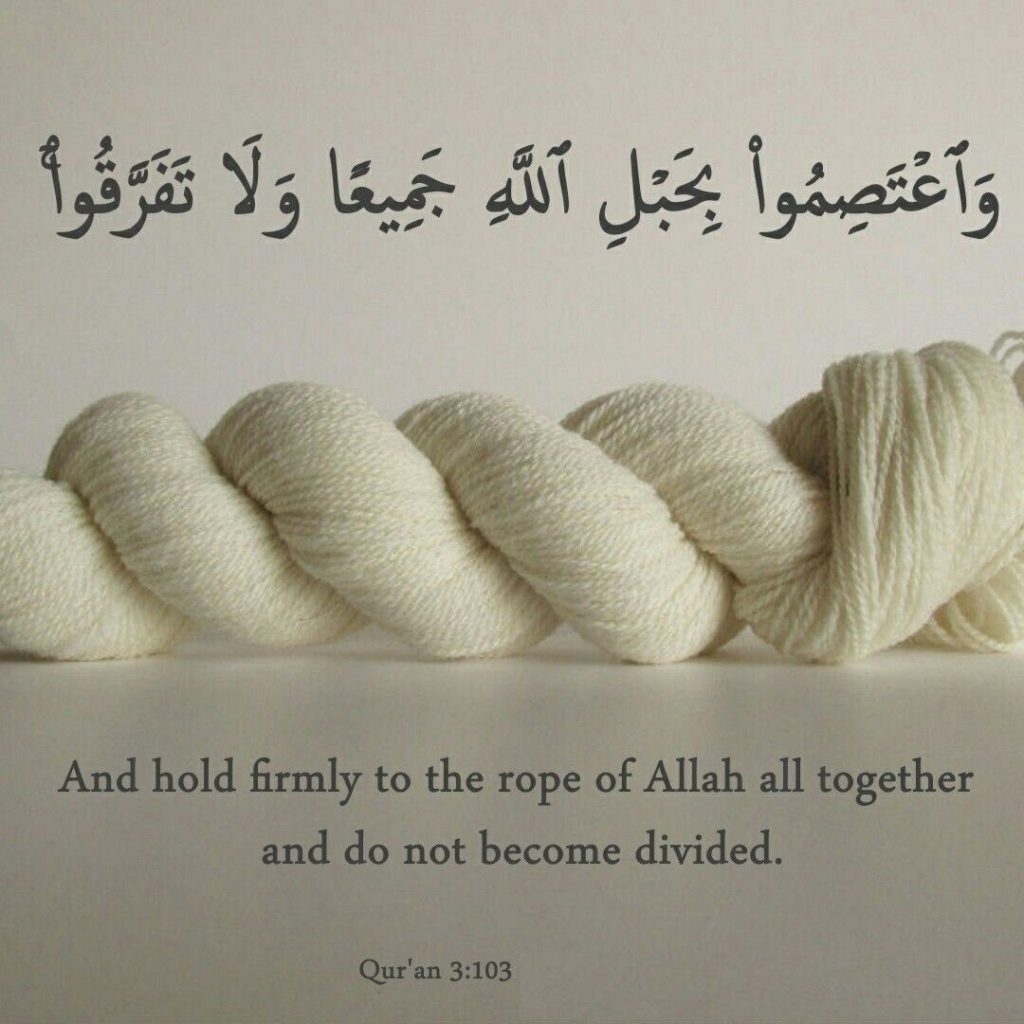
Rise and fall of Nations
It may appear that conversions will help dominance of one group over others due to more numbers but it must be known that everything that happens in this world is controlled by the well-known Laws of Nature. The same is true of the rise and fall of a nation. For the sufferings of Muslim Ummah, while blaming West, we must look in our condition, some soul searching is needed. What went wrong?
“Allah’s Messenger, peace and blessings be upon him, said, ‘Imminently, there will come a time when the nations gather against you, just as people gather around a feast.’ A man said, ‘Will it be because we are few at that time, O Allah’s Messenger?’ He responded, ‘No, you will be numerous in those times, but you will be as useless as the scum of the sea, and Allah will remove the fear that your enemies used to posses from you from their chests, and He will place al-Wahn in your hearts’, it was said, ‘What is al-Wahn?’, he responded, ‘Love of life, and hatred of death.’” [Thawdan (may Allah be pleased with him), narrated- Ahmad, Abu Dawud] The Quran says:
“If you suffer hardship, the enemy also suffers the same hardship. We alternate the days of victory and defeat among the people. GOD thus distinguishes the true believers, and blesses some of you with martyrdom. GOD dislikes injustice.” (Quran;3:140)
“If you turn away, He will substitute other people in your place, and they will not be like you.”(Quran’4:38)
“God does not change the condition of a people’s lot, unless they change what is in their hearts.” (Quran; 13:11)
By the world “people” the Quran means the nation or society, and by the word “heart” or “inner self” the Quran refers to individuals. Here the Quran refers to that law of nature which determines the fate of peoples or nations, says Molana Wahidudin Khan. This law applies without exception to all nations. According to this law, the destiny of a nation depends upon the individuals of which it is composed. Every individual is an important unit of his nation. If the individuals are good in character, the whole nation will be good, but if the individuals are bad in character, then the whole nation will become bad. This law tells us how to reform a nation or a society after deterioration has set in. This law gives us the starting point. Whenever it has become apparent that a nation has fallen in evil ways, we have to start our reform from its individual members; that is the only possible way to begin. You can successfully address an individual mind, but you cannot similarly address a crowd. This means that in such a situation we have to change individuals through education, both formally and informally. We have to change their minds and hearts, we have to change their way of thinking, we have to de-condition their conditioned minds. How to rebuild a society which has gone into decline? The answer is: Begin from the beginning. Begin with individual reform.
Conclusion
An effort has been made in series of articles since July 2018 to briefly unveil the Fallacious Comparison of Christianity and Islam. The brief analytical response should be sufficient to expose the misleading propaganda against Islam by Islamophobes. Hope it would have helped the people with intellect and wisdom to form a balanced view about Christianity and Islam.
This is a world where individuals, groups, and governments commit various forms of violence oppression and terror. Such violence is committed in the name of ideology, nationalism and religion. Fighting violence with more devastating violence enhances that vicious cycle. Enormous resources have been consumed in fighting extremism. No serious efforts have been made to eradicating the real causes of extremism, such as gross injustice and dehumanization of others. A fraction of these resources, coupled with a sense of honor, justice, and human equality would deal with most violence in a more constructive way.
While religion has been abused to justify senseless and unnecessary brutality it can be constructively invoked to stem the tide. The common values of Abrahamic faiths, in particular, can contribute greatly in this effort. It is the duty of religious scholars and clergy of all faiths to clarify these values and clarify misinterpretations of scriptures, not only to others, but also for their own religious communities. Conflict resolution and interfaith dialogue can help to attain peace in this global village. Let’s hear the call for the brotherhood of humanity:
“O humankind! We (Allah) have created you from a single (pair) of a male and a female and have made you into nations and tribes, so that you may come to know one another. Verily, the most honored of you in the sight of Allah is the most righteous (or Allah-conscious) of you. Surely, Allah is All-Knowing, All-Aware.” (Quran;49:13)
There is deep respect for all the faiths, anything which may be considered offensive or hurtful are incidental not intentional, which may please be overlooked graciously. Islam does not teach hatred but equity, justice and respect for non-Muslims:
“Allah does not forbid you to be kind and equitable to those who had neither fought against your faith nor driven you out of your homes. In fact Allah loves the equitable.” [Quran; 60:8].
People who sincerely want to follow the teachings of Jesus Christ and the way of God, should themselves read the Gospels and Quran. While reading Gospels the original Greek lexicon and word by word translation be compared with other translations. Seek help from God for guidance:
“Show me Your ways, O LORD; teach me Your paths. Guide me in Your truth and teach me, for You are the God of my salvation; all day long I wait for You. [Psalm 25:4-6]
“The path of the righteous is level; you, the Upright One, make the way of the righteous smooth”. [Isaiah 26:7] “Guide us to the straight path: the path of those You have blessed; not of those who have incurred Your wrath, nor of those who have gone astray.” (Quran;1:6-7)
“God has ordained for you the same religion which He enjoined on Noah, and which We have revealed to you, and which We enjoined upon Abraham and Moses and Jesus, so that you should remain steadfast in religion and not become divided in it. What you call upon the polytheists to do is hard for them; God chooses for Himself whoever He pleases and guides towards Himself those who turn to Him.” [Quran;42:13]
God shows the right path leading to salvation to those who seek it:
“And say: ‘The truth is from your Lord.’ Then whosoever wills, let him believe; and whosoever wills, let him disbelieve.” [Quran:18:29]
“Say: “O followers of earlier revelation! Come unto that tenet which we and you hold in common: that we shall worship none but God, and that we shall not ascribe divinity to aught beside Him, and that we shall not take human beings for our lords beside God.” And if they turn away, then say: “Bear witness that it is we who have surrendered ourselves unto Him.” (Quran;3:64).
References
http://SalaamOne.com/christianity-islam/


